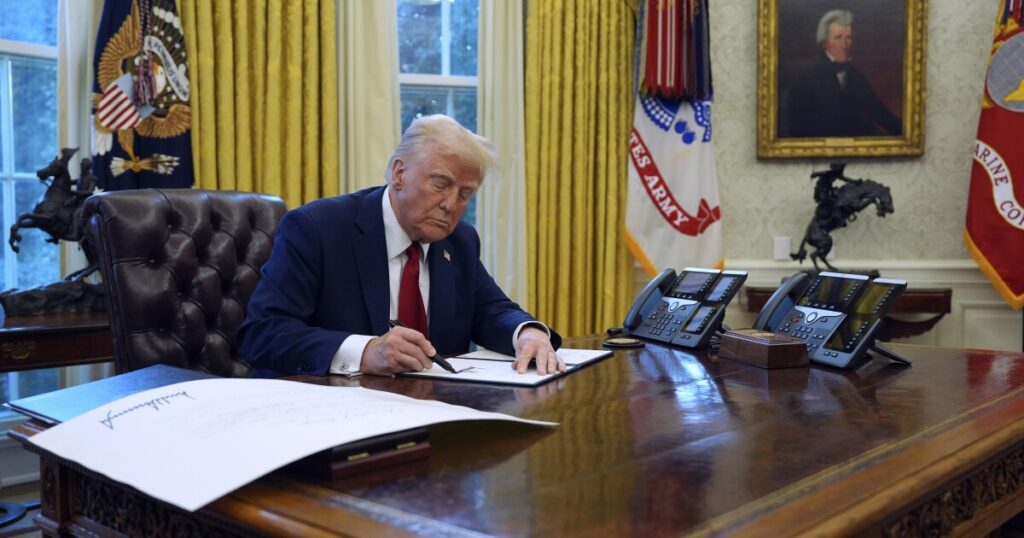Federal Agencies Remove Gender Information Following Executive Order
This week, the Trump administration mandated that all federal agencies eliminate content related to “gender ideology” from their websites. Reports surfaced on Friday confirming that this directive was being enacted across various platforms.
Order from the Office of Personnel Management
In a memo issued on Wednesday, Acting Director of the Office of Personnel Management, Charles Ezell, directed agencies to comply with an executive order by Friday at 5 p.m. ET. The stated goal of this order is to “defend women from gender ideology extremism.”
Guidelines for Compliance
The memo included directives aimed at “ending federal funding of gender ideology.” Among these instructions was the requirement to “remove all outward-facing media (websites, social media accounts, etc.) that promote or endorse gender ideology.”
Impact on Government Websites
As of late Friday, visitors to the Census Bureau’s 2020 Results page encountered a message stating that the section was undergoing maintenance. Additionally, related pages detailing sexual orientation and gender identity were also unavailable, amidst a wider pattern of content removal on official sites.
Responses from Academia and Activism
Social media buzzed with reactions from academics, journalists, and activists who reported the disappearance of essential information from government websites. For instance, Aaron Richterman, a scientist at the University of Pennsylvania, highlighted the absence of critical CDC HIV surveillance data. Similarly, KFF’s Cynthia Cox noted that the CDC’s Youth Risk Survey data was no longer accessible.
Clarification on the Intent of the Memo
In a statement released Friday evening, OPM communications director McLaurine Pinover clarified, “OPM sent guidance to agencies to remove gender ideology-related content from their websites by 5 pm today as part of the efforts to defend women and uphold the truth of biological sex against the radical claims of gender activists.” Pinover also indicated that there were no immediate plans to completely shut down websites that failed to comply.
Understanding ‘Gender Ideology’
The term “gender ideology” has been defined narrowly by Trump and other opponents of transgender rights, who use it to dispute the legitimacy of individuals identifying as a gender different from their assigned sex at birth. The executive order specifically dismisses the notion that “males can identify as women and vice versa” as a false claim.
Support and Opposition
Many advocates for transgender rights argue that referring to “gender ideology” mischaracterizes transgender identities as belief systems rather than recognizing them as valid identities. Recent polling from KFF and the Washington Post suggests nearly 2 million Americans identify as trans or transgender.
Additional Directives Concerning DEI Programs
The recent memo is not the only directive resulting from the Trump administration’s stance on information availability. In a separate memo addressing an executive order aimed at terminating “radical and wasteful government DEI programs,” Ezell instructed agencies to eliminate all content related to DEIA (diversity, equity, inclusion, and accessibility) from their websites.
Remarks from Trump
When questioned about the removal of DEI information, Trump responded, “It doesn’t sound like a bad idea to me. DEI would have ruined our country, and now it’s dead.”
Broader Implications of the Executive Order
The “Defending Women” executive order, alongside Ezell’s memo, extends beyond just modifying online content. Ezell encouraged agencies to review all programs, contracts, and grants to terminate any that promote or endorse gender ideology. He also emphasized that forms should ask for “sex” rather than “gender.”
Concerns About Intimate Spaces
The memo further directs agencies to ensure that “intimate spaces” are designated according to biological sex rather than gender identity, potentially limiting bathroom access for transgender and nonbinary employees. NPR reached out for clarification about what constitutes “intimate spaces” but did not receive a response.
Copyright 2025 NPR


